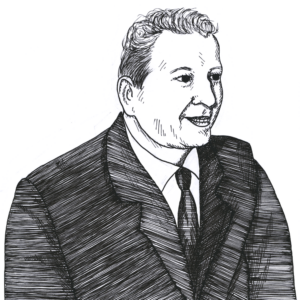How much do you know about Bruno Leoni? Friedrich Hayek credited Bruno Leoni with shaping his ideas on laws and legislation. James Buchanan said that Leoni identified problems that led to his own work on public choice. How is it possible, then, that so few of us know of the groundbreaking Italian political philosopher? But it seems, well, we don’t talk about Bruno…

EconTalk fan fav Mike Munger and host Russ Roberts set out to change this in their recent conversation about Leoni. Munger begins by recounting Leoni’s eventful, “frenetic” life. A political philosopher, Leoni taught a post-war course called “Doctrine of the State,” which Munger describes as more like doctrine of freedom and law. Indeed Munger believes it to have been a “signpost” along the way to both Austrian economics and public choice.
Leoni shared the lecture stage with Hayek and Friedman (indeed this was the origin of his Freedom and the Law). He was an early and active member of the Mont Pelerin Society, and he was elected its second president just before his death. Despite his untimely death, Leoni had a significant influence on three different parts of what we now think of as mainstream classical liberal scholarship- 1. Hayek’s distinction between law and legislation, 2. James Buchanan’s identification of problems with political consent and political authority, and 3. the law and economics movement.
Let’s turn to the legacy of Leoni, and START talking about him. After listening to the episode, we encourage you to ponder the questions below, and even more that you’ll take time to share your responses in the comments.
1- Munger tells us that F.A. Hayek attributed his famous distinction between law and legislation to Leoni. What is this distinction, and how does Munger explain the differences in Hayek’s conception to that of Leoni? Is living in a world of more laws (relative to legislation) to be desired? Why or why not? (And lest we inspire Munger’s wrath, what role do transaction costs play in your answer?)
2- What are the three characteristics Munger describes as comprising Leoni’s conception of the rule of law? Why does Munger say that in Leoni’s ideal system, “If the system is operating properly, there are no cases that come before a judge?”
3- How is Leoni’s conception of the rule of law different from the sort Roberts describes (~44 minutes)? What role is there for tradition or precedent in Leoni’s ideal, and to what extent do you find this role sufficient?
4- What are the problems with [written] law as Roberts recounts? To what extent do you see Leoni’s theory, as recounted by Munger, as addressing these problems? Why, under Leoni’s purported system, would judges not need to be trained in jurisprudence or worry about precedent?
5- Roberts and Munger close with a discussion of universality, one of the characteristics of the rule of law for Leoni. They note the “Golden Rule” as one of its more common iterations. What’s the problem with this iteration according to Munger? (Hint: he says it’s not do unto others as you would have them do unto you., and it’s also the part that Hayek leaves out.)




